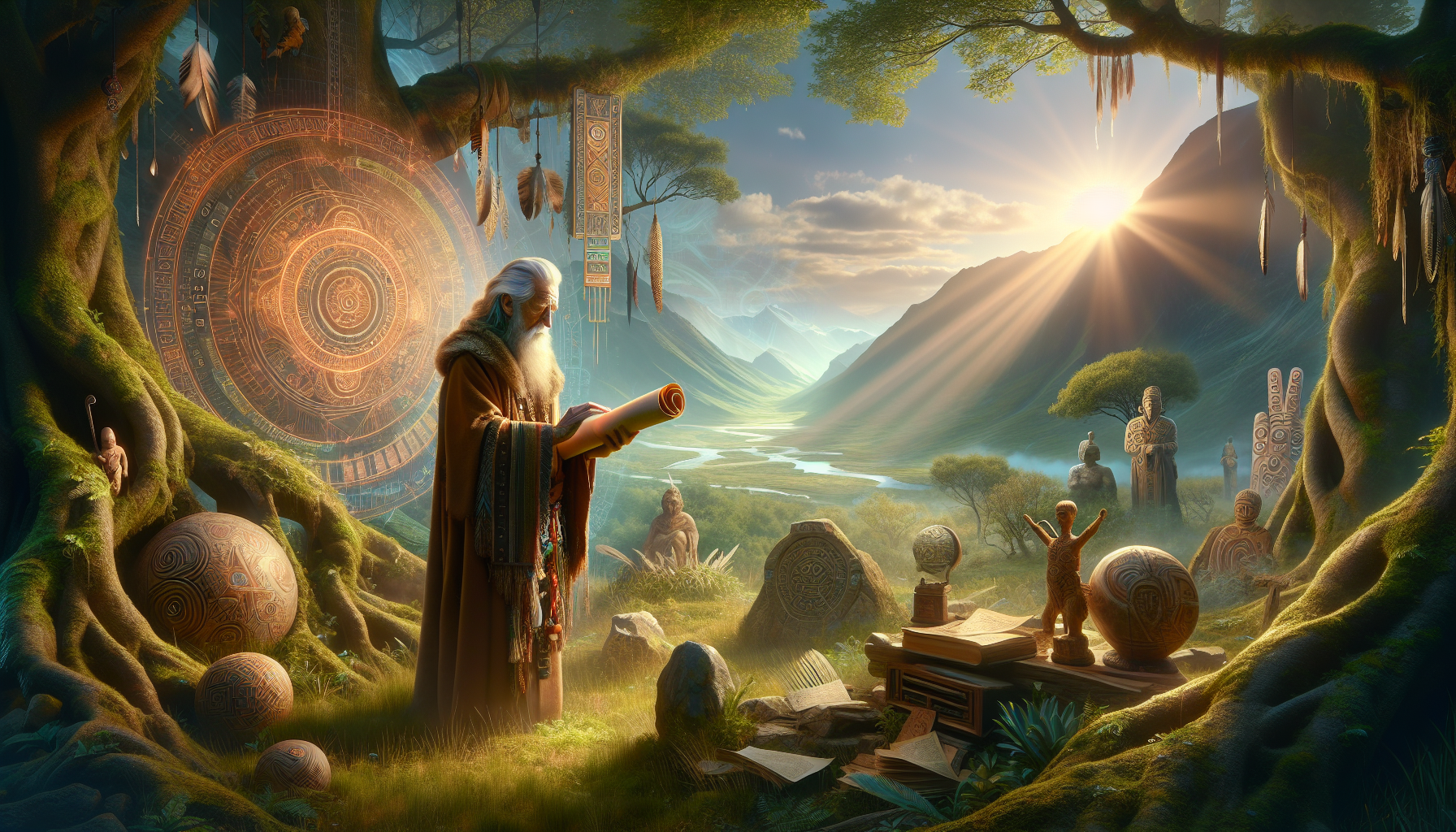In a world driven by technology and rapid change, where the allure of the new often overshadows the wisdom of the old, we find ourselves at a unique crossroads. As we navigate this ever-evolving landscape, there is an increasing call to pause, to listen, and to learn from the whispers of those who came before us. This article delves into the profound journey of “Unearthing the Wisdom: Embracing the Voices of the Ancestors,” a voyage that invites us to reconnect with the rich tapestry of human history and culture, where the echoes of ancestral wisdom offer guidance and solace in our modern lives. 🌍✨
Imagine a tapestry woven with the threads of countless generations, each strand representing the lived experiences, stories, and teachings of our forebears. These are not mere relics of the past but vibrant legacies that continue to influence and shape our identities. In the hustle and bustle of contemporary existence, these ancestral voices might seem distant or even forgotten. Yet, they hold profound insights and timeless lessons, waiting to be rediscovered and cherished. This journey isn’t about romanticizing the past but about integrating its wisdom into our present-day consciousness.
As we embark on this exploration, we’ll delve into the myriad ways different cultures honor and engage with their ancestors. From the intricate rituals of indigenous communities to the ancestral veneration practices in Asia, Africa, and beyond, we will uncover the universal threads that connect us to our past. These practices are not merely symbolic gestures but are deeply rooted in the belief that our ancestors remain an integral part of our lives, guiding us through their enduring presence. By embracing these traditions, we open ourselves to a wealth of knowledge that transcends time and space.
Furthermore, this article will examine the intersection of ancestral wisdom and modern science, revealing how the two can coexist and enrich one another. As we uncover ancient practices that have been validated by contemporary research, such as mindfulness, herbal medicine, and communal living, we realize that the voices of the past often hold keys to solving today’s challenges. By bridging the gap between the old and the new, we create a harmonious balance that fosters innovation while honoring the roots from which we come.
Finally, we’ll explore practical ways to incorporate ancestral wisdom into our daily lives, transforming abstract concepts into tangible actions. Whether through storytelling, genealogy, or personal reflection, there are countless avenues to connect with our heritage and draw strength from it. In doing so, we not only honor those who paved the way for us but also enrich our journey, finding clarity and purpose in the lessons of the past. This article aims to serve as a guide, inviting you to listen, learn, and ultimately embrace the voices of your ancestors as a source of wisdom and inspiration. 🕊️🌿
Understanding the Ancestors’ Wisdom: A Deep Dive
The concept of ancestral wisdom transcends mere historical interest, reaching into the core of cultural identity and spiritual grounding. When we delve into the teachings of our forebears, we often unearth a profound sense of understanding that is both enlightening and empowering. This wisdom, accumulated over generations, is a rich tapestry of stories, beliefs, practices, and lessons that offer guidance for contemporary life. In this section, we will explore the significance of embracing these ancient voices, examining their impact on personal growth and societal development.
Ancestral wisdom can be seen as the collective knowledge that our predecessors have gathered over time. This encompasses everything from oral traditions and folklore to cultural rituals and spiritual practices. Such wisdom is not only a record of past experiences but also a living guide to navigating the present and future. By integrating these ancient teachings into our lives, we can gain insights that promote well-being, resilience, and a sense of belonging.
To fully appreciate the value of ancestral wisdom, it is essential to understand the diverse ways in which this knowledge has been preserved and transmitted across generations. Oral storytelling, for instance, is a powerful medium through which narratives of bravery, love, loss, and triumph are shared. These stories often encapsulate moral lessons and ethical values, serving as a compass for behavior and decision-making. Similarly, rituals and ceremonies often carry profound symbolic meanings, connecting individuals to their cultural roots and fostering a sense of community.
The Role of Storytelling in Preserving Ancestral Wisdom
Storytelling is perhaps the most enduring and impactful method of preserving ancestral wisdom. Through stories, our ancestors have passed down essential life lessons, cultural values, and historical events. These narratives not only entertain but also educate, providing frameworks for understanding complex human experiences. As we engage with these stories, we are invited to reflect on our own lives, drawing parallels between past and present challenges and triumphs.
One of the key aspects of storytelling is its ability to convey abstract concepts through relatable characters and situations. For instance, fables often feature animals as protagonists, allowing listeners to explore ethical dilemmas in a more approachable manner. These tales highlight virtues such as honesty, bravery, and compassion, encouraging listeners to embody these qualities in their own lives. Moreover, storytelling fosters a sense of continuity, linking us to our heritage and reminding us of the timeless nature of human struggles and aspirations.
Another significant dimension of storytelling is its capacity to adapt to changing contexts while maintaining core messages. This adaptability ensures that ancestral wisdom remains relevant, allowing each generation to interpret and apply it in ways that resonate with contemporary challenges. In this way, storytelling serves as both a bridge to the past and a beacon for the future.
Embracing Ancestral Voices: Practices and Rituals
Ancestral practices and rituals provide another vital avenue for engaging with the wisdom of the past. These customs, often steeped in spiritual significance, offer frameworks for connecting with our roots and grounding ourselves in the present. Whether through meditation, dance, or communal ceremonies, these practices create spaces for reflection, healing, and renewal.
Rituals often involve symbolic actions that represent larger concepts or beliefs. For example, a cleansing ritual might use water to signify purification, inviting participants to release negativity and embrace positive energies. Such practices not only facilitate personal transformation but also strengthen communal bonds, as individuals come together to honor shared traditions.
Incorporating ancestral practices into modern life requires a balance between preservation and adaptation. While it is crucial to respect and uphold traditional forms, it is also important to allow for evolution, ensuring that these practices remain meaningful and accessible. By doing so, we can create a dynamic interplay between past and present, enriching our lives with the depth of ancestral wisdom.
The Significance of Ancestral Practices in Modern Life
In today’s fast-paced world, many individuals seek solace and meaning through ancestral practices. These rituals offer a counterbalance to the chaos of modernity, providing moments of stillness and introspection. By engaging in such practices, we cultivate a deeper understanding of ourselves and our place in the world, fostering a sense of connection to something greater than ourselves.
One of the benefits of ancestral practices is their ability to ground us in the present moment. Whether through meditation, chanting, or movement, these activities encourage mindfulness, inviting us to fully experience the here and now. This presence can lead to greater clarity and focus, allowing us to approach life’s challenges with calm and resilience.
Moreover, ancestral practices often emphasize the importance of community, reminding us that we are part of an interconnected web of relationships. By participating in communal rituals, we reinforce social bonds and nurture a sense of belonging. This collective engagement fosters empathy and understanding, promoting harmony and cooperation.
Comparative Analysis: Ancestral Wisdom Across Cultures
To appreciate the diversity and richness of ancestral wisdom, it is instructive to compare how different cultures engage with their past. While the specifics of traditions and practices may vary, there are common threads that unite these diverse expressions of wisdom. In this section, we will examine some of the ways in which different cultures honor and incorporate their ancestral knowledge.
Below is a table that compares key aspects of ancestral wisdom across three distinct cultural traditions: Indigenous North American, African, and East Asian.
| Cultural Tradition | Key Aspects of Ancestral Wisdom | Practices and Rituals |
|---|---|---|
| Indigenous North American | Connection to the land, respect for nature, oral traditions | Storytelling, vision quests, sweat lodges |
| African | Community-centered living, reverence for elders, oral histories | Drumming, dance, libation ceremonies |
| East Asian | Harmony and balance, ancestor veneration, philosophical teachings | Tea ceremonies, ancestor altars, meditation |
As you review the table above, consider how each culture’s approach to ancestral wisdom reflects its unique worldview and values. While there are differences in emphasis and expression, all share a profound respect for the past and a desire to integrate its teachings into daily life.
For a deeper understanding of how these practices are being revitalized in contemporary settings, watch this insightful video: “Reviving Ancestral Wisdom in Modern Times” – Channel: Cultural Insights. 📺
Lessons from Ancestral Wisdom: Applying Ancient Teachings Today
One of the most compelling aspects of ancestral wisdom is its timeless relevance. The lessons learned from our ancestors are not relics of the past but living truths that can guide us through the complexities of modern life. By applying these teachings, we can navigate challenges with greater wisdom and grace, fostering personal growth and societal progress.
- Explore the stories of your ancestors and reflect on their lessons.
- Incorporate ancestral practices into your daily routine for grounding and balance.
- Foster community connections and engage in collective rituals.
As you consider these insights, remember that the voices of the ancestors are always with us, offering guidance and wisdom. By listening and embracing their teachings, we can enrich our lives and contribute to a more harmonious world.

Conclusion
Certainly! Here is a comprehensive conclusion for your article on “Unearthing the Wisdom: Embracing the Voices of the Ancestors”:
—
In conclusion, the exploration of ancestral wisdom is not merely an academic exercise but a profound journey into understanding our collective human experience. Throughout this article, we have delved into the rich tapestry of knowledge left by those who came before us, emphasizing the relevance and transformative power of their insights in our modern world.
Firstly, we examined the significance of ancestral wisdom in providing a sense of identity and belonging. The stories, traditions, and teachings of our ancestors offer a lens through which we can view our present challenges and opportunities. By embracing these narratives, we not only honor the past but also forge a deeper connection with our roots, which in turn enriches our personal and communal lives.
Furthermore, we highlighted the role of ancestral wisdom in fostering resilience and adaptability. Our ancestors faced numerous trials and tribulations, and their solutions often carry timeless principles that can guide us today. Whether it’s their understanding of nature, community building, or conflict resolution, these lessons can inspire us to tackle contemporary issues with renewed perspective and vigor.
Moreover, the article underscored the importance of intergenerational dialogue. By engaging with elders and preserving oral histories, we ensure that the wisdom of the past is not lost but rather integrated into our evolving narrative. This dialogue is crucial for cultural preservation and innovation, as it allows for a synthesis of old and new ideas that can lead to societal advancement.
The environmental insights of our ancestors were also a focal point. In a time of ecological crisis, their sustainable practices and deep respect for the earth serve as crucial reminders of the balance needed between progress and preservation. By revisiting these practices, we can develop more sustainable approaches that honor the planet and ensure its health for future generations.
Finally, we discussed the spiritual dimension of ancestral wisdom. For many cultures, the voices of the ancestors offer guidance and support in navigating life’s challenges. Embracing this spiritual connection can provide comfort, inspiration, and a sense of purpose that transcends the material aspects of existence.
In light of these points, the importance of ancestral wisdom cannot be overstated. It acts as a guiding compass, offering insights that are both timeless and timely. As we continue to face complex global challenges, turning to the voices of our ancestors can empower us to create solutions that are rooted in wisdom and compassion.
I encourage you, dear reader, to reflect on the teachings of your own ancestors and consider how their wisdom might inform your life and choices. Engage with family members, participate in cultural practices, and seek out stories that have been passed down through generations. In doing so, you will not only enrich your own understanding but also contribute to a broader cultural renaissance.
Feel free to share this article with others who may benefit from the insights discussed. Let’s keep the conversation alive, and together, embrace the voices of the ancestors as a powerful tool for personal and collective growth.
For further reading, you can explore resources such as National Geographic’s exploration of indigenous knowledge and Smithsonian Magazine’s articles on cultural heritage. These sources offer valuable insights and expand on the themes discussed here.
In closing, let us remember that the wisdom of our ancestors is a gift that can illuminate our path forward. As we stand on the shoulders of those who came before us, may we find the courage to honor their legacy by living with purpose, mindfulness, and an unwavering commitment to a better world for all 🌍.
—
Toni Santos is a sensory storyteller and soundscape artisan whose work explores the forgotten language of the Earth through acoustic ecology storytelling. With a deep reverence for the natural world’s sonic textures, Toni crafts narratives that awaken our ears to the subtle music of forests, winds, waters, and wild silence.
His creative journey is rooted in a desire to preserve and interpret the acoustic heritage of environments, both ancient and fragile. From the echo of birdsong in a disappearing jungle to the resonance of stones in sacred landscapes, Toni’s stories reflect the memory held in sound—often overlooked, yet deeply felt.
With a background in environmental aesthetics and sonic design, Toni blends field recordings, visual symbolism, and poetic insight to create immersive experiences that honor the sonic soul of nature. His work does more than document; it invites listeners to re-tune themselves to the rhythms of life that still pulse beneath modern noise.
As the voice behind Vizovex, Toni shares sound-based studies, ambient narratives, and reflective content that help others reconnect with how sound shapes memory, meaning, and place.
His work is a tribute to:
The lost soundscapes of vanishing ecosystems
The role of natural acoustics in cultural and emotional memory
The healing potential of listening deeply to the world
Whether you’re an artist, an ecologist, or someone drawn to the quiet power of listening, Toni invites you into a space where every rustle, ripple, and resonance becomes a story—one note, one place, one heartbeat at a time.




